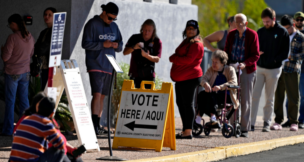Attorney: lawsuit seeking ballot hand count flawed
Howard Fischer, Capitol Media Services//June 9, 2022//
Attorney: lawsuit seeking ballot hand count flawed
Howard Fischer, Capitol Media Services//June 9, 2022//
A lawyer for the state’s largest county is telling a federal judge that a lawsuit by two Republican candidates seeking to require a hand count of the 2022 election is...













































